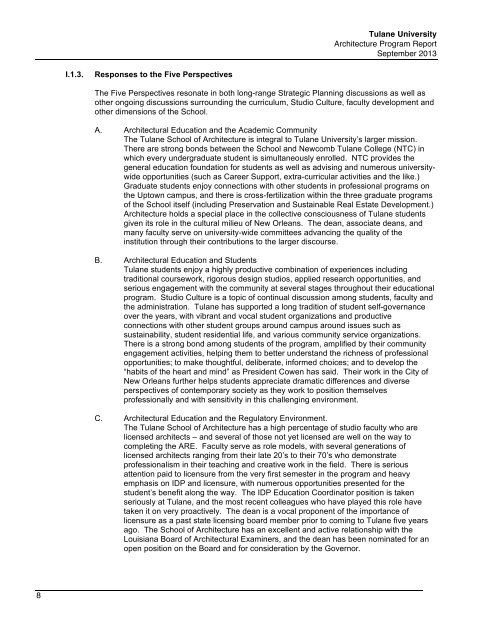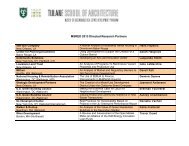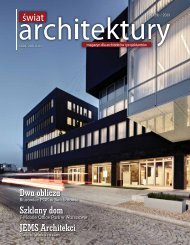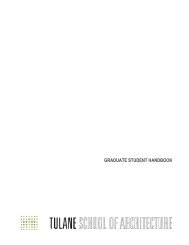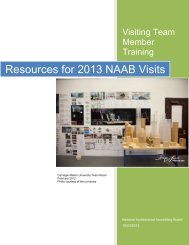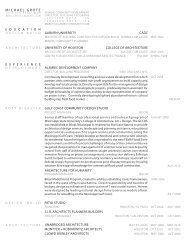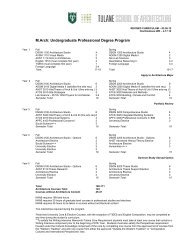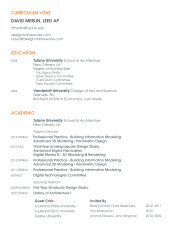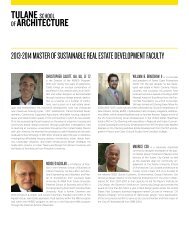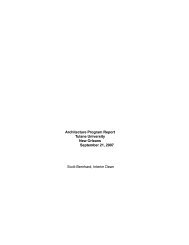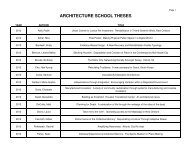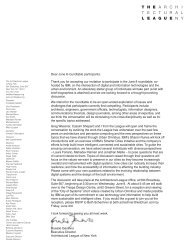NAAB Architecture Program Report (APR) 2013 - Tulane School of ...
NAAB Architecture Program Report (APR) 2013 - Tulane School of ...
NAAB Architecture Program Report (APR) 2013 - Tulane School of ...
You also want an ePaper? Increase the reach of your titles
YUMPU automatically turns print PDFs into web optimized ePapers that Google loves.
<strong>Tulane</strong> University<strong>Architecture</strong> <strong>Program</strong> <strong>Report</strong>September <strong>2013</strong>I.1.3.Responses to the Five PerspectivesThe Five Perspectives resonate in both long-range Strategic Planning discussions as well asother ongoing discussions surrounding the curriculum, Studio Culture, faculty development andother dimensions <strong>of</strong> the <strong>School</strong>.A. Architectural Education and the Academic CommunityThe <strong>Tulane</strong> <strong>School</strong> <strong>of</strong> <strong>Architecture</strong> is integral to <strong>Tulane</strong> University’s larger mission.There are strong bonds between the <strong>School</strong> and Newcomb <strong>Tulane</strong> College (NTC) inwhich every undergraduate student is simultaneously enrolled. NTC provides thegeneral education foundation for students as well as advising and numerous universitywideopportunities (such as Career Support, extra-curricular activities and the like.)Graduate students enjoy connections with other students in pr<strong>of</strong>essional programs onthe Uptown campus, and there is cross-fertilization within the three graduate programs<strong>of</strong> the <strong>School</strong> itself (including Preservation and Sustainable Real Estate Development.)<strong>Architecture</strong> holds a special place in the collective consciousness <strong>of</strong> <strong>Tulane</strong> studentsgiven its role in the cultural milieu <strong>of</strong> New Orleans. The dean, associate deans, andmany faculty serve on university-wide committees advancing the quality <strong>of</strong> theinstitution through their contributions to the larger discourse.B. Architectural Education and Students<strong>Tulane</strong> students enjoy a highly productive combination <strong>of</strong> experiences includingtraditional coursework, rigorous design studios, applied research opportunities, andserious engagement with the community at several stages throughout their educationalprogram. Studio Culture is a topic <strong>of</strong> continual discussion among students, faculty andthe administration. <strong>Tulane</strong> has supported a long tradition <strong>of</strong> student self-governanceover the years, with vibrant and vocal student organizations and productiveconnections with other student groups around campus around issues such assustainability, student residential life, and various community service organizations.There is a strong bond among students <strong>of</strong> the program, amplified by their communityengagement activities, helping them to better understand the richness <strong>of</strong> pr<strong>of</strong>essionalopportunities; to make thoughtful, deliberate, informed choices; and to develop the“habits <strong>of</strong> the heart and mind” as President Cowen has said. Their work in the City <strong>of</strong>New Orleans further helps students appreciate dramatic differences and diverseperspectives <strong>of</strong> contemporary society as they work to position themselvespr<strong>of</strong>essionally and with sensitivity in this challenging environment.C. Architectural Education and the Regulatory Environment.The <strong>Tulane</strong> <strong>School</strong> <strong>of</strong> <strong>Architecture</strong> has a high percentage <strong>of</strong> studio faculty who arelicensed architects – and several <strong>of</strong> those not yet licensed are well on the way tocompleting the ARE. Faculty serve as role models, with several generations <strong>of</strong>licensed architects ranging from their late 20’s to their 70’s who demonstratepr<strong>of</strong>essionalism in their teaching and creative work in the field. There is seriousattention paid to licensure from the very first semester in the program and heavyemphasis on IDP and licensure, with numerous opportunities presented for thestudent’s benefit along the way. The IDP Education Coordinator position is takenseriously at <strong>Tulane</strong>, and the most recent colleagues who have played this role havetaken it on very proactively. The dean is a vocal proponent <strong>of</strong> the importance <strong>of</strong>licensure as a past state licensing board member prior to coming to <strong>Tulane</strong> five yearsago. The <strong>School</strong> <strong>of</strong> <strong>Architecture</strong> has an excellent and active relationship with theLouisiana Board <strong>of</strong> Architectural Examiners, and the dean has been nominated for anopen position on the Board and for consideration by the Governor.8


